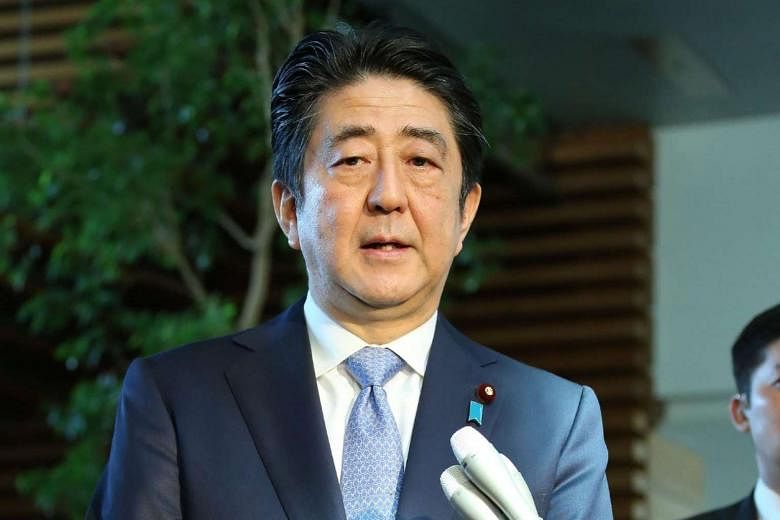TOKYO (Bloomberg) - Abenomics hasn't had much impact reviving the fits-and-starts Japanese economy. That's the verdict of nearly two dozen economists canvassed in a new Bloomberg News survey.
Prime Minister Shinzo Abe's signature domestic policy received an average score of 4.6 points out of 10 for overall economic effectiveness in a survey of 23 economists by Bloomberg from Feb 26 to March 4.
The survey sounded out economists about the efficacy of Abe's three-pronged program - aggressive monetary policy, fiscal stimulus and a regulatory overhaul - on Japanese growth, deflation and structural reforms on a scale of 1 (worst) to 10 (best).
The Bank of Japan's monetary expansion and asset purchases have helped push the yen down to multi-year lows against the dollar and sparked a stock market rally from just before Abe took power in late 2012 through most of last year.
However, the economy has performed unevenly, falling into recession in mid-2014 and then swinging between quarters of growth and contraction last year. Data Tuesday confirmed the economy shrank an annualized 1.1 per cent in the final three months of 2015.
HSBC economist Izumi Devalier warned it is probable that gross domestic product will shrink again in the period ending March 31. Now, attention is increasingly shifting to whether Abe's government will push through structural reforms that many economists believe are needed to produce sustainable growth.
More than half-way through his projected term in office, which is expected to end in 2018, time is running short for Abe to push through bolder plans such as job-market reforms and getting more women into management roles.
Foreign investors are turning their back on Abe, who proclaimed "Japan is back" and "buy my Abenomics!" at the New York Stock Exchange in September 2013. Among them is Alan Gayle, a senior strategist for Atlanta-based Ridgeworth Investments, which has about US$42.5 billion under management.
"The story in Japan is not unfolding the way a lot of people expected, so that's going to put downward pressure on their markets going forward," according to Gayle, who has been cutting back international exposure, including Japan. "The Japanese have been trying a lot of things, and they don't seem to be gaining traction. Most of the comments that I'm hearing float around the notion that Japan really needs to look at structural reforms as a way to unlock potential."
The Topix index has slumped 12 percent this year as foreign investors, who account for about 70 per cent of stock trading in Japan, have sold on a net basis for eight straight weeks. That's in stark contrast to 2013, when overseas investors pumped a record 15 trillion yen (US$132 billion) into the market.
In the Bloomberg survey, the economists were more critical about the so-called third arrow of Abenomics focused on structural reform to pursue a growth strategy than about changing the atmosphere with rhetoric and stimulus measures. They rated Abenomics at an average 4.1 and 4, respectively, for putting Japan's economy on a sustainable growth path and laying the future foundation with structural reforms, while the rating was 5.1 for ending the deflationary mindset.

